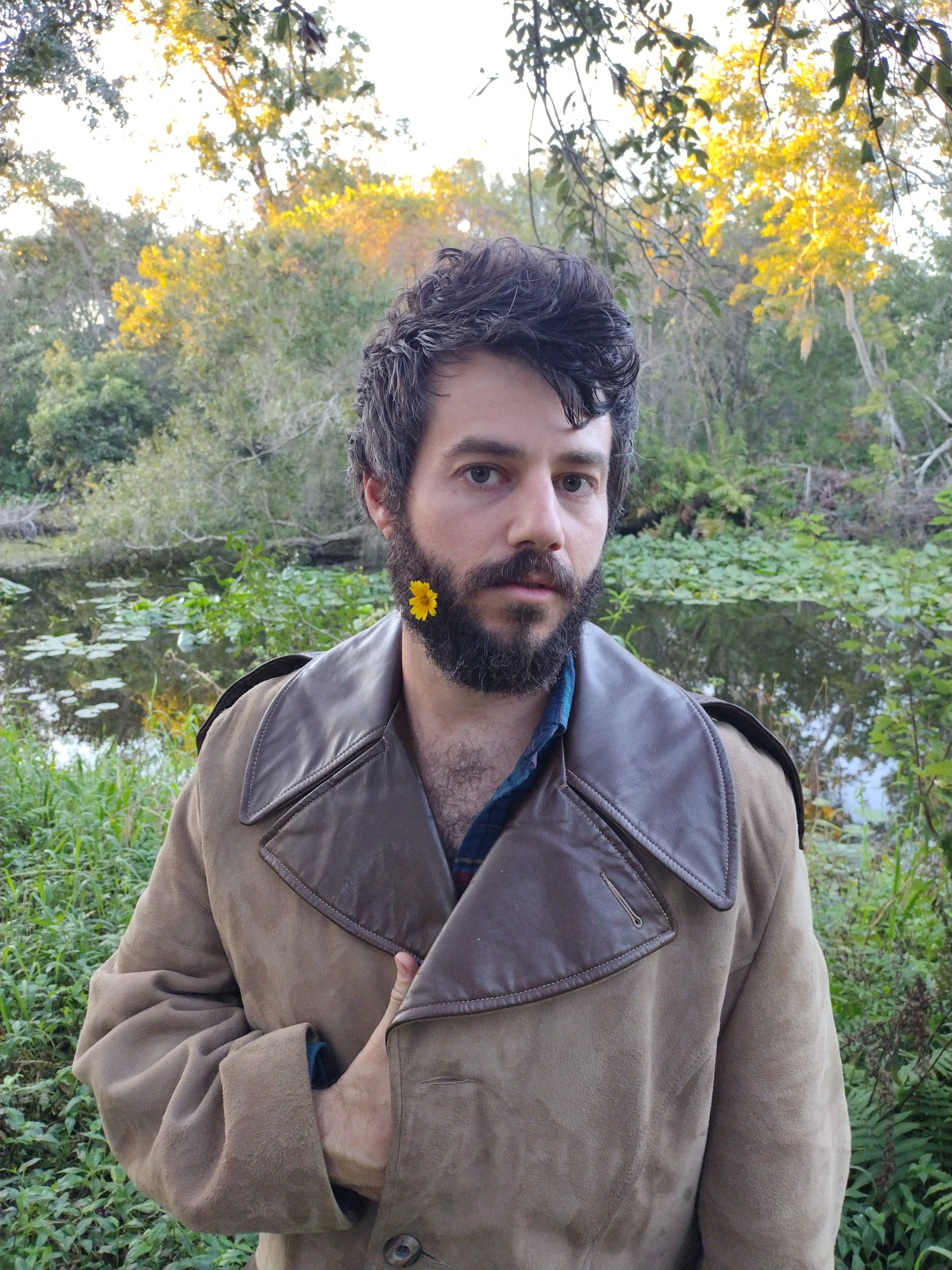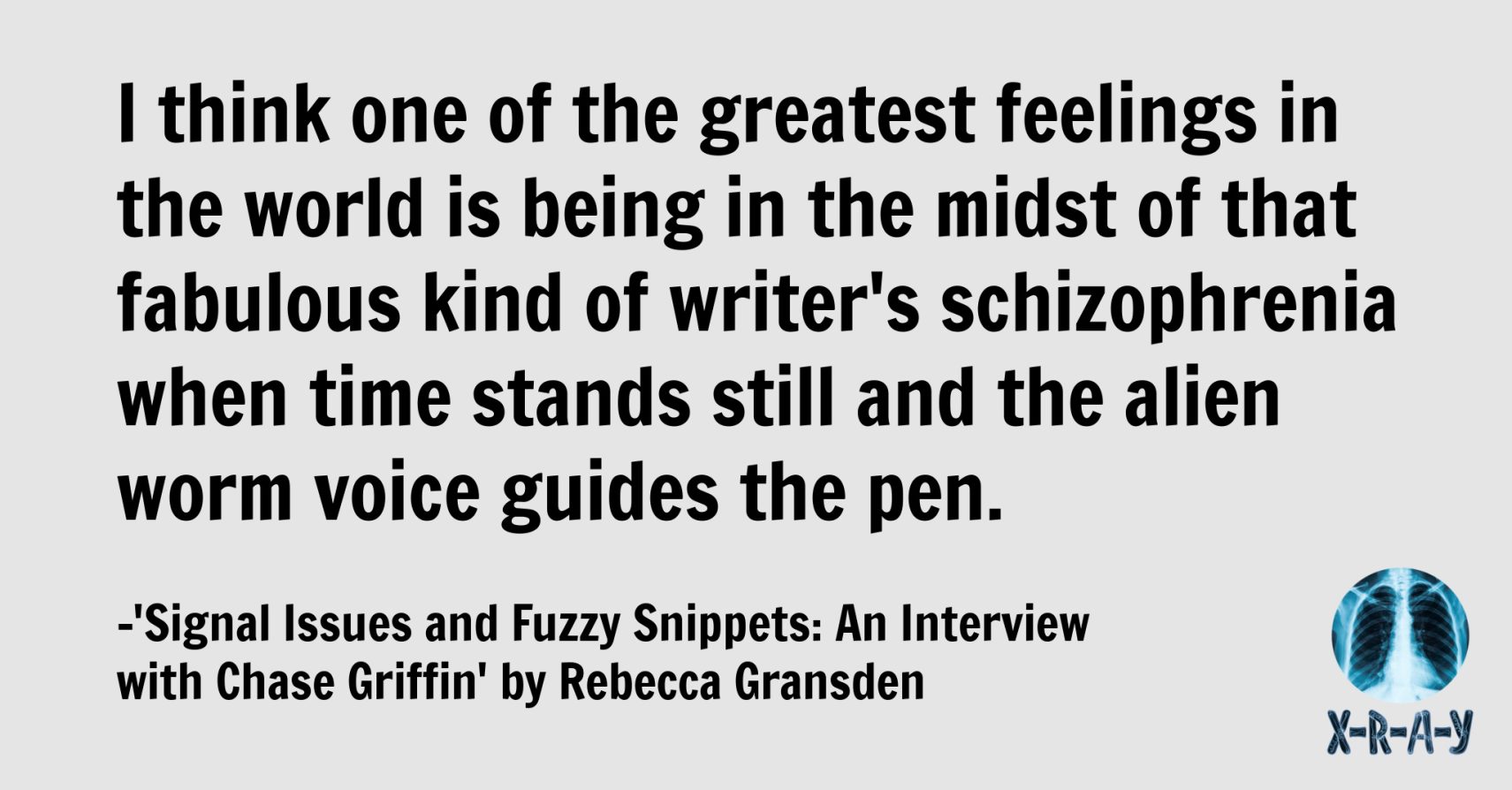 Chase Griffin’s alchemical style continues with Peter Zoidoid & the Commonplace (Corona/Samizdat, 2026). At once a fanciful record of an unfathomable mind and experiment in merriment, the book is unabashed with its lingual adventurousness. When life gives you strange frequencies it’s time to whistle your own tune. Griffin is a psychedelic jester, and, as is common to that type, also the smartest guy in the room. I spoke to him about the book.
Chase Griffin’s alchemical style continues with Peter Zoidoid & the Commonplace (Corona/Samizdat, 2026). At once a fanciful record of an unfathomable mind and experiment in merriment, the book is unabashed with its lingual adventurousness. When life gives you strange frequencies it’s time to whistle your own tune. Griffin is a psychedelic jester, and, as is common to that type, also the smartest guy in the room. I spoke to him about the book.
Rebecca Gransden: Where there are gaps in this text, there are gaps in my life. I was only able to write this introductory material after an extended break from text of all types. They say the only way to get out of a black hole is to have never gone into it. While I don’t recommend going any further into this one, it’s already too late for you.
-Roy Christopher, 2024
What’s the deal? When and how was this written and translated? Where does Roy Christopher fit into all this?
Chase Griffin: Zoidoid was written in an alternate 1980’s by an alternate-me. And Roy is an alternate-Roy. And Roy has half-translated (half-translated because he suffered some Lovecraftian-madness while translating and he couldn’t finish) Zoidoid from a fake future language (alternate-me is also a philologist) into English. Thanks for writing that intro, alternate-Roy!
RG: How long did it take to write Peter Zoidoid & the Commonplace? Did time pass fast or slow or in-between?
 CG: It took a year to write Zoidoid in my head. I was working as an overnight stocking clerk at the time. And it took a couple nights to let the whole thing pour out of my head onto the page. The year was long because overnight jobs are fucking awful. The two days passed slowly, but that was a pleasant slowness. I think one of the greatest feelings in the world is being in the midst of that fabulous kind of writer’s schizophrenia when time stands still and the alien worm voice guides the pen.
CG: It took a year to write Zoidoid in my head. I was working as an overnight stocking clerk at the time. And it took a couple nights to let the whole thing pour out of my head onto the page. The year was long because overnight jobs are fucking awful. The two days passed slowly, but that was a pleasant slowness. I think one of the greatest feelings in the world is being in the midst of that fabulous kind of writer’s schizophrenia when time stands still and the alien worm voice guides the pen.
RG: It’s been a while since I’ve written in commonplace. I shouldn’t be writing so sporadically in here… the way I’ve been writing in here for the past twenty or so units. I am realizing now that I should be much more diligent.
What are your aims regarding language and style for the book? Any intentions regarding world building or backstory?
CG: Context: Peter has this notebook filled with his archeologist, archivist parents’ writings on the past (our present) and the language of the past and how the language might be able to unlock the secrets of the mind control device permeating all.
Further context: So the commonplace book referenced is both Peter’s diary (the back half of the fictional notebook which makes up the whole of Peter Zoidoid & the Commonplace) and an archeologist book (the front half of the fictional notebook which we do not get to read).
I went with this constrained epistolary style because that style best suits a story about translation and a world that makes unreliable narrators of its population.
RG: Believe me, I wish I could turn off fresh emphasis. I don’t want this trouble. I wish to be a googly-eyed wacko normie schmuck just like everyone else. Who needs this kind of stress?
What would you like to emphasise?
CG: I don’t know. Having a faulty, sparky monkey brain is great. There’s nothing wrong with the mass madness that is humanity. Because none of it matters. I love my madness. It’s my superpower. And only the outwardly mad ones are the sane ones. We’re all flawed and terrible because we’re gross animals. But who cares. Let’s all forgive each other for being born dumb animals. The sooner we get over this mass psychological determinism we are all bound to, then the sooner the big, dumb Doubt can begin, and then we can all accept it, and then we can go ahead and finally begin gently, cautiously being big, dumb monkeys attempting to not be big, dumb monkeys (which I think involves a lot of mass inaction and quiet and staving off entropy and the elders starving for the young (my modest proposal)). Maybe it is written that we will stop doing things for long periods of time. Maybe it is written that we will finally give up and realize we’re not good or better because we’ve done nothing bad. We’re just lucky. The circumstances we were born into gave us ourselves. We did nothing to earn a self. Not one of us has free will. So these words don’t matter. Nothing matters.
God, I’m such a drama queen.
Ask me tomorrow. I’ll emphasize a belief in something tomorrow.
RG: Why am I still eating this dip?
What is the best dip? What is your favourite dip? (Not necessarily connected).
CG: Guacamole. Guacamole.
RG: Have you ever smirked momentously?
CG: Sure. After a good fart.
RG: I believe I’m having a strange reaction to death. Makes sense. I often have strange reactions to many things.
Have you ever had a strange reaction? Do you aim to establish a particular type of reaction in those who read your work?
CG: Sure, I have strange reactions all the time. Life is weird and I have a faulty, sparky monkey brain.
And no, not really. I’m not looking to establish a particular reaction in readers. I’m looking for readers who are down to have fun with the text.
RG: I think I will crack open my briefing case. Today’s setting will be archoniff sider and maybe it will help with my damn sass.
What is the importance of sass to Peter Zoidoid & the Commonplace? Where does sass begin and end? How much is too much? Does sass have an objective measure?
CG: It might not be sass. Sass might be a random word that Roy chose when he was translating.
And I don’t know about the beginning and ending of sass. Maybe there is no beginning or ending.
Yes, I feel like sass has an objective measure and its measuring instrument is an oversized spanner covered in purposeless springs and gears.
RG: Please introduce Bippy.
CG: Bippy is Peter’s dead mom’s cat. This prissy furball is the hero of the book and the best character I have ever written.
RG: I’ve written too much and I am going to become an unshakable thing. How horrid!
Have you encountered any horrid unshakeable things, either in the writing of the book or generally?
CG: Surely. All the time. I encounter horrid unshakable things all the time. I live in a densely populated village. How could I not encounter horrid unshakable things? Don’t read the local paper, by the way. But what am I to do? Nothing really. I see it all as character building. I have to be like the Buddha Or maybe not. People suffer so much more than me, so why shouldn’t I suffer some too? I just got lucky because I wasn’t born into terrible circumstances. No one earned anything. How horrid!
RG: The book features song lyrics. Are there melodies behind these lyrics or do they exist solely on the page?
CG: I have melodies for them, but the reader can make up whatever melody they want.
RG: What significance does music have to Peter Zoidoid & the Commonplace? Do any bands or albums share common elements?
CG: Music plays a big role in prosody, and prosody is very important to me.
Music is always on my mind
Music prompted the writing of Zoidoid. One night at work, while I was listening to “Doctor Worm” by They Might Be Giants, I came up with the basic outline for Zoidoid.
Also, Peter Zoidoid & the Commonplace and its fraternal twin, Satanic Panic & the Very Special Episodes (they will be published together as The Ampersand Collection on Corona Samizdat), are like the twin Guided By Voices albums Bee Thousand and Alien Lanes. The common elements are the signal issues and equipment blockage. The books and the albums have these fun messages to send you but the low studio quality and signal issues (mostly due on both parts to limited budget) only allow fuzzy snippets of the messages to get through. And, of course, this fuzzy snippet-ness (this constraint technique) is all a part of the charm.
RG: I am the only untranslatable person in the world. There’s no one here who can decipher the whispered gibberish.
Does your writing demand comprehension? What is lost or found in translation?
CG: My writing doesn’t demand comprehension. All that matters is the emotion and the emphasis, the incomprehensible human-ness (the faulty, sparky monkey-ness), poking through the rigmarole-membrane of the literal and figurative institutions.
My works are more like fantasy and fairy tales (which don’t require explanations for their motions) than science fiction (which is like a fairy tale giving excuses for its behavior).
RG: How do you define New and Old?
CG: Pre-old is our time. Old is the glorious golden civilization that arose from the ashes of our time. New is the oppressive society that followed the downfall of Old.
RG: Does Peter Zoidoid & the Commonplace have anything to say when it comes to politics and current affairs?
CG: Not sure. I don’t think there’s much to say. We’re all actor-bodies of the leviathan-theatre and all political conversation is a big script. It’s all catechisms. Even what I just wrote. And also with you! Gesundheit!
But maybe the book is asking about obscurantisms and mesmerisms. Are we searching too hard or too little for obscurantisms and mesmerisms? Are we too paranoid or not paranoid enough? Should we be putting our energy elsewhere? Is this, the searching and obsessing over possible hidden things, a design—like a figurative Air Loom?
RG: How do you approach the use of signs and symbolism in your work?
CG: Character and story always come first. The conceptual materials are handed to me by the characters and the story. Then comes the welding torch.
Going back to music, this is how a lot of the great concept albums were made.
Fellowshipping equals motif discovery.
RG: Onomatopoeia—what are its limits?
CG: What are the patience-limits of your ideal reader?
RG: How would you advise someone approach reading this book? Any particular demeanour or method of engagement that would enhance the experience?
CG: My books like to be read aloud (although many readers have told me they prefer to read them silently)—in the same way Shakespeare is best ingested when read aloud aloud. Not saying I’m Shakespeare by the way. I need to add way more dick and fart jokes to my work if I want to be Shakespeare. With something like Hamlet, even if you don’t understand the language and the cultural references, if you read it aloud you understand the emotions and the emphasis. And maybe that kind of understanding is more important than direct understanding, which is an understanding that always ends up getting folded into the flux.
Also, use whatever pronunciation you want for my made-up words. And then stick to whatever pronunciation you choose.
RG: I looked back to Shea to make sure he wasn’t examining my facial expressions too closely.
What facial expression best expresses what Peter Zoidoid & the Commonplace is trying to express?
CG: How about that fun face Johnny Cash is making in that famous picture of him flipping the bird?
RG: Do you hate computers?
CG: Meh. I’m pretty indifferent. What even is a computer? Are they terrible for the earth, like air conditioners and cars?
RG: Believe me. I didn’t want to trust him. I didn’t want to set aside my urge to stomp his brains in. I didn’t want to not hate him, the fucking mentor fuck. But I submitted, and I set it all aside.
Have you ever trusted someone to be your mentor? If so, what influence have they had upon Peter Zoidoid & the Commonplace?
CG: No. No mentors.There have been Lots of cool old guys and gals in my life though and they’ve given me really good advice.
Please excuse this aside. The most trustworthy old people I ever met was this hippie-pirate couple who owned this fantastic used bookstore and junkshop called The Memex. I spent most of my youth sitting in the back of their store reading old copies of Mondo2000, the Illuminatus Trilogy, Rocco Atleby novels, Ursula Le Guin, and the Whole Earth Catelog.
RG: Do you ever get the feeling of brain growth caused by reading? In a physical, oh jeez, something changed and I’m not sure in what way?
CG: Yeah, definitely. I feel squirming sometimes. And I hear a little voice. The voice says things like, “It’s just you and me, buddy,” and, “More guacamole, please.”
RG: What portmanteaus, neologisms and/or spoonerisms do you like? Are there literary devices you would NEVER use, because they are lame? Conversely, are there literary devices you consider underused, so would like to advocate for?
CG: I like whatever looks good on the page.
And, I don’t like to knock stuff. Because I wouldn’t want to indirectly knock a fellow writer’s style. Everybody is allowed to do their thang.
And, I don’t know what’s overused or underused. I use devices when the need arises.
RG: Is there a chance that Bippy could have her own spinoff universe?
CG: Yes, absolutely. Bippy deserves ten books.
RG: Which renowned philosophers would read and appreciate Peter Zoidoid & the Commonplace?
CG: He’s a TV character, but I feel like Bernard Black might like my book. I had his voice in my head, impatiently making up words and saying sassy lil deconstructions, when I was writing this one.
Although, Bernard would probably open my book, drop a piece of jammy toast in it, make a face at his mess, and then toss the book-jam-toast monstrosity at an annoying customer.
RG: How is information transferred via Peter Zoidoid & the Commonplace?
CG: Information is transferred through the air via the Air Loom.
Spoiler alert: The Air Loom was built during the golden civilization when we finally figured out the horrible truth. We built the Air Loom in order to hide the Lovecraftian revelation from ourselves.
RG: Have you ever kept a journal, diary, or log?
CG: Yeah, I keep a journal. I mostly write about the cute things my kids do. I keep a commonplace book too. That’s where I do all of my story and character mining.
RG: What is your dream for the book?
CG: My dream is for it to get folded into the book cocooning all of my current books, SCHLEMIEL GAUCHO, which is about this one-man Brothers Grimm who is collecting postmodern fairy tales (my books) before they are swallowed up by the flux and incorporated in the fold.
RG: Where is Peter Zoidoid and where is Chase Griffin?
CG: Peter Zoidoid is in the book writing with the slime-pen filled and Chase Griffin is in Tampa writing this answer.

